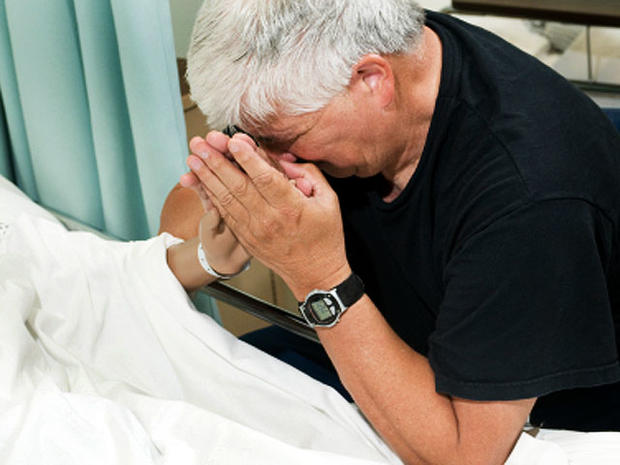Study: Spouses whose partners had a heart attack more likely to use antidepressants, anxiety meds
(CBS News) Heart attacks may lead to heartbreak in the victim's spouse, according to a new study.
People who had a spouse who had a heart attack - regardless if they lived or died - were more likely to be on antidepressants, the study showed. The use of anxiety drugs went up as well.
Rosie O'Donnell shines spotlight on women's heart attacks
Heart attack test takes one hour to determine if someone is having cardiac event
Researchers pointed out that previous studies have shown that 18 percent of heart attack patients themselves are at risk of serious depression, but no one has examined the effect on the person's loved ones.
"This is a major public health issue for which there seems to be very little awareness among doctors and policy makers," first author Dr. Emil Fosbol, a cardiology research fellow at Duke Clinical Research Institute, said in a press release. "I think the most important finding of this study is that the system needs to consider the care needs for spouses too, not only when a patient dies from an [a heart attack], but also when the patient is 'just' admitted to hospital with an [heart attack] and survives."
Heart disease is still the leading cause of death in the U.S., according to the Centers for Disease Control and Prevention. About 785,000 Americans have a first coronary attack and another 470,000 have another attack annually. Over 616,000 people died of heart disease in 2008, about one in four deaths.
The study, which was published online on Aug. 21 in the European Heart Journal, looked at data from Danish registries including the country's National Civil Status Registry. In total, they studied 16,506 spouses of people who died from a sudden heart attack, otherwise known as an acute myocardial infarction (AMI), between 1997 and 2008 and 49,518 spouses of people who died from causes unrelated to AMI. They also examined 44,566 spouses of patients who suffered a non-fatal AMI and 131,563 spouses of people admitted to hospital for a non-fatal condition unrelated to AMI.
In the cases where the partner died from a heart attack, the surviving widow or widower was three times more likely to start taking antidepressants compared to the year before. About 50 times as many spouses were found to use a benzodiazepine, a type of tranquilizer used to treat anxiety, after their spouse's incident.
Those who had a spouse that had a heart attack but didn't die increased antidepressant use by 17 percent after the event. The other group who had a spouse admitted to the hospital for a non-fatal condition unrelated to a heart attack did not increase antidepressant use.
They discovered that men were more likely to suffer from depression and consider suicide after their wife's survival or death from an AMI than women.
For people whose significant others died due to a non-AMI cause, they were also more likely to use medication but not as much as the group that lost a spouse to a heart attack. The researchers hypothesized that this may be because the widows and widowers who lost their significant other to an sudden AMI didn't have time to mentally prepare for the death and are experiencing a loss similar to post traumatic stress disorder (PTSD).
Maureen Talbot, senior cardiac nurse at the British Heart Foundation, told the BBC that it is important to consider the whole family's health when a person has a heart attack.
"We know that people can feel anxious or helpless when a loved one has a heart attack. It is essential they receive the emotional and practical support they need during this often traumatic time," she explained.
A change in the psychological health of the patient and the spouse is something that has been frequently observed, Dr. Neica Goldberg, a national spokeswoman for the American Heart Association, told ABC News. She added that doctors sometimes don't pay attention to the person who has to take care of the victim.
"We don't always take the time to focus on quality of life or what the family is going through," she said.
